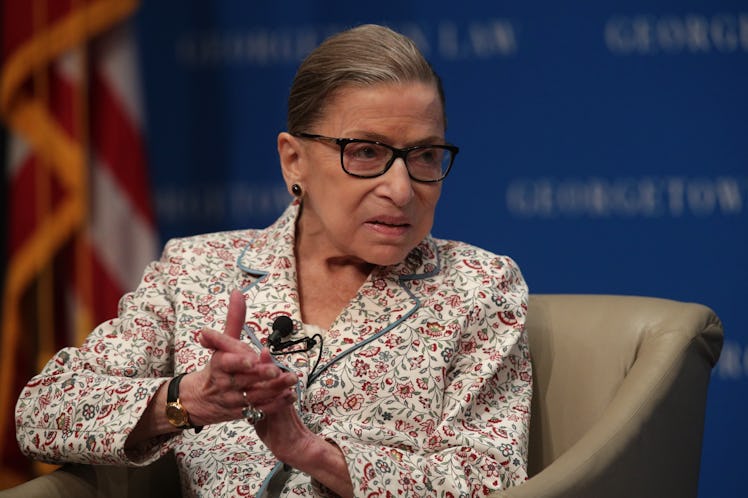
RBG Got Real About The Possibility Of Eliminating The Electoral College
In recent election cycles, the Electoral College has proven controversial. In several presidential elections in the past 20 years, the election winner has managed to claim the presidency without winning the national popular vote thanks to the system, which assigns votes by state. With so much controversy about whether this centuries-old system accurately represents national opinion, it's only natural that both voters and lawmakers have been speaking out about it on both sides. Recently, one of the biggest names in American law chimed in, when Supreme Court Justice Ruth Bader Ginsburg commented on eliminating the electoral college — which, spoiler alert, probably won't happen any time soon.
At the University of Chicago on Sept. 9, Ginsburg said changing the Electoral College system would be “more theoretical than real,” according to the Chicago Sun-Times. In fact, she took it one step further and said that, because amending the Constitution is very difficult, “it’s largely a dream. … I know that from experience.”
It’s a harsh truth, but that doesn’t mean Ginsburg is opposed to the idea in general. In 2017, Ginsburg said she would support removing the Electoral College. At Stanford University in February 2017, she said that one thing she would like to change is the Electoral College, according to CNN. Even then, she echoed similar sentiments that “that would require a constitutional amendment, and amending our Constitution is powerfully hard to do.”
In presidential elections, the winner is decided based on electoral votes, rather than the national popular vote. In most states, whoever wins the state's popular vote also wins the state's electoral votes, which range from three votes in less-populous states, to up to 55 votes in states with higher populations. An absolute majority of 270 votes is required to win. However, the system means that someone who doesn't have nationwide majority support can win — for example, in 2016, Donald Trump won the presidential election with 306 electoral votes, despite Hillary Clinton winning the popular vote by more than 2.8 million votes nationwide. This has happened before in American history, most recently when George W. Bush defeated Al Gore in 2000.
After President Donald Trump’s election in 2016, a slim majority of American voters preferred the popular vote to the Electoral College system, according to a Marist Poll. This opinion remains popular today. As for Trump himself, he has recently come out as a proponent of the Electoral College, saying he changed his mind about his previous support of the popular vote.
However, Ginsburg is right about how difficult it would be to change it up. Changing the Constitution first requires a two-thirds vote in the House of Representatives and the Senate, and then a ratification by three-quarters of states. Another possible way could be the state level. If enough states individually committed to the popular vote by giving their electoral college votes to the winner of the national popular vote — without considering who was most popular in that state — they could in effect elect the popular president.
In August 2019, the system returned to the forefront of national controversy when a federal court of appeals ruled it was unconstitutional for states to throw out the vote of a faithless elector. Essentially, the court was ruling in favor of a state elector in Colorado who decided not to vote for Hillary Clinton despite her being the state’s more popular candidate. The court ruled that Electoral College members can vote for whomever they wish — meaning that, theoretically, a handful of Americans can decide the results of an election.
Especially with the 2020 Democratic presidential race in full swing, many politicians have spoken out with opinions similar to Ginsburg’s. While it’s unclear whether candidates plan to follow through with the laborious task of amending the Constitution, they’ve surely thrown around ideas about it. Sens. Bernie Sanders, Elizabeth Warren, and Cory Booker, as well as Mayor Pete Buttigieg, have denounced the Electoral College.
There's almost no chance the Electoral College is going away before it gets to decide next year's presidential election. For years, conversations about doing away with the system have just been talk with no real action. But, like RBG, a girl can dream, and hopefully it won't take another unpopular presidential victor for the system to change.